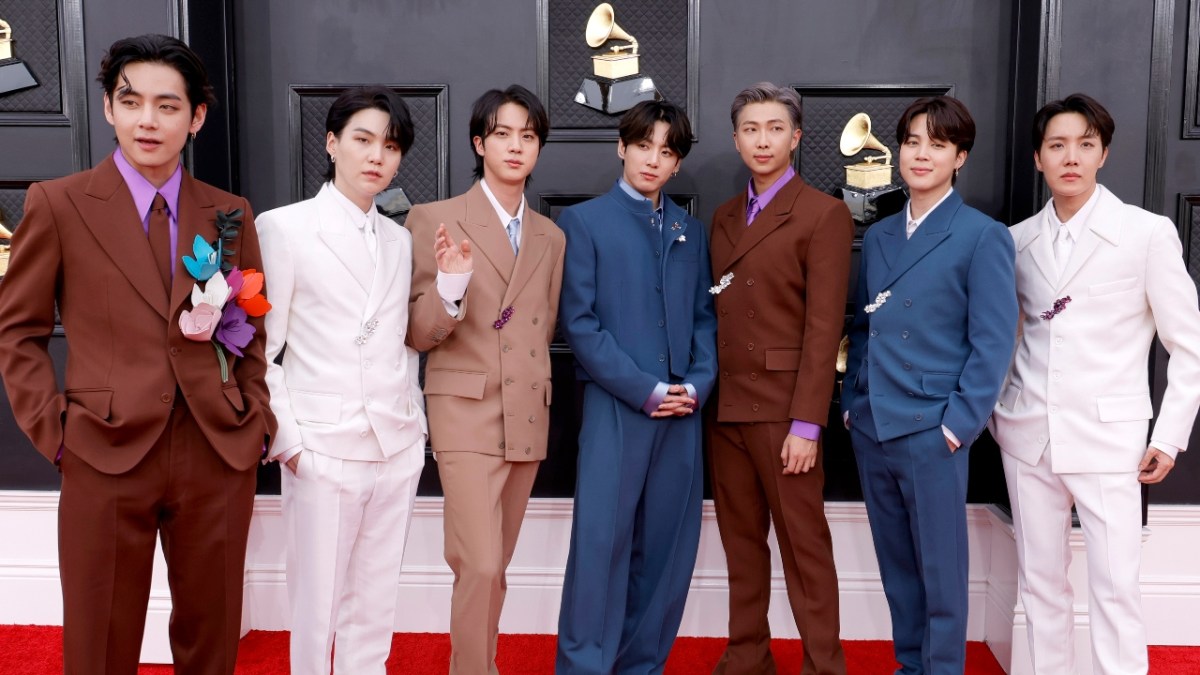BTS is currently the most well-known musical act in the world, and so are the group members: RM, Jin, Suga, J-Hope, Jimin, V, and Jungkook. The septet started their rise to fame in 2013 and have since gathered a legion of loyal fans, dedicated to supporting the group’s music, as well as each member’s individual careers.
Although the general public knows BTS by its catchy group tunes that mix rap with the vocalists’ beautiful singing voices, the band also has a share of solo tracks under its belt. With BTS’ extensive musical repertoire, it’s natural that some of the members’ solos might be overshadowed by bigger hits. However, solo songs should never be dismissed, as they’re the perfect way for each member’s individual talents to shine through. Solos usually allow listeners to catch a glimpse into the performer’s inner emotions and thoughts, helping the audience get to know them better. So, to get you started on that journey, here’s a list of the 10 best BTS members’ solo songs. Of course, every member has solo songs outside of the band (and some even full albums), but for the purpose of this article, we’re focusing only on the members’ works released under the group.
10. “Trivia: Seesaw”
With “Trivia: Seesaw,” the oldest rapper in the group, Suga, steps out of his comfort zone, lending his talents to rhythmic rapping within a chorus; and the result is one of BTS’ most well-liked solos. Even though BTS fans are used to lyrics conveying messages in complex ways, “Trivia: Seesaw” takes the cake for longest-running metaphor in a song, as the rapper compares a romantic relationship to a seesaw (that’s right, the long plank in the playground that children use to alternate up and down). Although unconventional, the idea is that all relationships have their highs and lows, and while at first that makes for a fun ride, eventually, it can grow tiring and pointless, as a middle ground is impossible to find. When the time comes to recognize the end though, the task is made difficult when no one wants the responsibility of taking the initial step. Because of this, the couple is doomed to drag their dying relationship along.
9. “Euphoria”
Performed by Jungkook, “Euphoria” is unquestionably BTS’ best-known solo song. Right after its release in 2018, the track’s title trended worldwide, and the song took the number one spot on Billboard’s U.S. World Digital Songs chart. Although its catchy chorus must be part of the song’s success, there’s definitely more to it. As we all know, euphoria is an emotional state of extreme happiness or excitement, something that is perfectly represented by this tune. Set in a major key, “Euphoria” has a very bright and colorful feeling to it, filling the listener with jovial optimism, something we all need from time to time. And, of course, Jungkook’s impeccable vocals do the melody more than justice.
8. “Outro: Ego”
Fun, vibrant, and joyous — that’s the best way to describe “Outro: Ego.” This song is very distinctively J-Hope’s, matching perfectly with the rapper’s sunny personality, by which he is well-known. One of BTS’s most upbeat songs, “Outro: Ego” is an unapologetic celebration of life, with a funky vibe that urges any listener to dance. In this track, the rapper looks back on his arduous past, and how that molded his identity, while also embracing the future with open arms, trusting that all his choices in life will lead him to where he’s supposed to be. To J-Hope, whatever the future holds doesn’t matter nearly as much as creating his own trajectory in life and being true to himself.
7. “Epiphany”
Jin’s “Epiphany” is one of BTS’ most beloved songs, not only for its melodic sound, but also for the emotions it brings forth in the listener. Set in F major, this ballad depicts a sense of joy and peace, accompanied by a somewhat regretful feeling, which is highlighted by the song’s message. With “Epiphany,” Jin reflects on his past actions, adapting himself to his significant other as an act of love, to the point of wanting to live his life for that person. However, no one can sustain that type of existence for long, at least not without losing themselves, and it comes to a point where one has to face this fact. “Epiphany” is about the realization the singer comes to after that journey — that someone should respect and love themselves before someone else. In a way, this song is a love letter to one’s self.
6. “Serendipity”
Much like the word this song is titled after, Jimin’s “Serendipity” is based on the concept of an event (or chain of events) that happen by chance resulting in a happy outcome. In this case, the joyous occurrence is the meeting of someone you grow to love, except, unlike what the song’s title might indicate, the singer believes that none of it is a coincidence, and fate has brought them together. With a soothing and very delicate sound, the track explores the joy and innocence of pure love, and how your world seems changed after meeting that special someone. Jimin’s honey-like voice definitely helps portray this sentiment in a unique way, making the song feel like everything good and sweet in the world.
5. “My Time”
With an R&B-influenced melody, accompanied by Jungkook’s clear-as-crystal vocals, “My Time” is one of BTS’ biggest successes in terms of solos. The song feels very personal for the singer, as it deals with his experience growing up in the spotlight. Being the youngest in the group, Jungkook stepped into fame at 15 years old and was forced to adapt to busy work schedules, while completing his studies and trying to maintain a social life, something important for anyone, but especially for a teenager. “My Time” reflects on the singer’s feeling of living at a different speed than his peers, comparing that to constantly moving through different timezones (metaphorically and literally), and thus never knowing what the right time is. With this, Jungkook expresses a certain feeling of loneliness and unsteadiness, posing to himself the question of if he’ll ever manage to find his time.
4. “Persona”
RM’s “Persona” is a hip-hop track, a genre the BTS leader is best known for. Those who know him will also know how much the rapper enjoys getting introspective while penning a new song, and pondering over difficult subjects, something showcased in “Persona,” as it constantly poses the question: “Who am I?” A persona is a version of oneself presented to and perceived by others, instead of the authentic self; thus someone can have multiple personas, which might make it harder to know who one truly is. With this song, RM seems to direct various questions not only to himself but to the audience, who subconsciously create different versions of him, while also voicing others’ distorted opinions of him. Toward the end of the song though, RM explicitly addresses himself, and proudly embraces all different sides of himself, the good and the bad. All this makes “Persona” a powerful song about reclaiming your identity.
3. “Interlude: Shadow”
BTS’ Suga has always been known for exposing his innermost thoughts and emotions in his work, which oftentimes leads to some very raw songs. “Interlude: Shadow,” much like the Map of the Soul: 7 album itself, draws inspiration from Jung’s psychological theory of the shadow, an unconscious part of the self, made up of repressed instincts, emotions, and ideas, buried by the mind in order to adapt to the society we live in. In this song, Suga expresses his ambitions, and the consequences they have brought him, reflecting on his climb to fame and the fear of failure and loneliness that comes with it. Using the shadow metaphor, Suga conveys to the audience that success also cultivates the most negative parts of himself, as the higher he flies and more light is cast on him, the bigger his shadow grows. Another detail that makes this song as loved as it is, is the point of view change toward the end as the rapper’s voice becomes distorted, representing the shadow taking over, and forcing Suga to confront that he never escape it — they are one.
2. “Lie”
The fourth track on BTS’ Wings album, Jimin’s “Lie” left a lot of people awestruck at the time of its release in 2016. Although it starts off with an elegant string orchestra, the song quickly develops a more haunting sound, as the singer paints the picture of the situation he’s in — caught in a cycle of lies he cannot break, despite his best efforts. “Lie” evokes mixed emotions in the listener, as the lyrics and Jimin’s angelic voice portray a cry for help, while the melody, in contrast, sounds somewhat sinister, perhaps reflecting the sneakier part of one’s mind; the one that feeds you lies about yourself.
Another brilliant detail in this song is a technique where the composition reflects the lyrics’ meaning. How is this done, you ask? Well, musically inclined folk will realize that most of “Lie” uses minor chords, leading the listener to believe it will continue that way, however, when it reaches the chorus, the song abruptly changes to major, jarring the audience with the key change, and effectively portraying a lie within the song itself. To finish off in style, contrary to most songs, “Lie” unexpectedly ends in its fourth beat, leaving the listener with a sense of unease, which matches the rest of the song.
1. “Singularity”
“Singularity” is a rare jewel to be found in the midst of BTS’ extensive discography, as it’s not the type of sound we’re used to from the band. This song, with its smooth R&B and soul influences, is perfectly suited for V’s incredibly deep voice. In fact, it would be quite difficult to imagine another BTS member pulling off this type of song as effortlessly as V does. Thematically, “Singularity” is a dark song, but unlike “Lie,” it makes you want to lean into that darkness, enraptured by its sensual and atmospheric melody. The track relays the message of someone waking up from an illusion of romantic love, where they had to bury their true self under an iced lake and silence their voice for the sake of someone else’s acceptance. This way, “Singularity” speaks on the realization that one is singular, unique, yet alone, and the struggle of maintaining that when your identity is created by others, something that is best portrayed by V when he rhetorically asks: “Have I lost myself, or did I gain you?”
It certainly wasn’t an easy task to choose from all of the BTS members’ solos, but now you can rest assured that you’ve been presented with the best of the best. After checking out these songs though, you should definitely look into the rest of their works, which are very much worth exploring as well.











Published: Aug 31, 2022 09:10 am